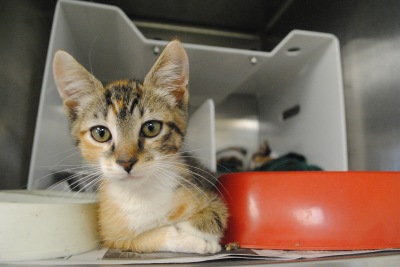Christina Kelso June 23, 2013 The Florida Times-Union
Original Publication Link: ‘Kitten University’ program looks to help kittens make it to adoptable age
From beneath porches and stairwells, behind vending machines and foliage, and inside homes and alleyways, they’re born into the world.
“We all sit here kind of holding our breath,” said Denise Deisler, executive director of the Jacksonville Humane Society. “We know they’re coming and we are going, ‘all right. Where are they? When are they coming?’ And then, all of a sudden — bam — they’re here. You just can’t keep up with it.”
The kittens have arrived.

As the weather warms under mid-spring sun, cats begin to breed and kitten season begins. Kittens are born by the hundreds and their numbers climb with the temperature, an annual reminder to residents and rescue groups that there can always be too much of a good thing.
“It slammed us,” Deisler said. “Overnight we went from zero to a couple hundred.”
In Northeast Florida, kitten season typically hits hard starting in April and can run strong through September, according to the Humane Society. Homeless cats and kittens fill shelter walls and foster homes beyond capacity, stretching animal welfare resources to the limit.
This year, Jacksonville was not to be caught off guard.
Anticipating their arrival, Jacksonville’s three largest animal welfare organizations — Jacksonville Humane Society, First Coast No More Homeless Pets and Animal Care and Protective Services — spent the months prior to kitten season preparing for the grand reopening of Kitten University.

A SANCTUARY
The only neonatal kitten nursery in Northeast Florida, Kitten University provides sanctuary to homeless underage, underweight kittens unable to find foster homes.
The nursery nurtures kittens until they reach 8 weeks old, 2 pounds and check off with a clean bill of health.
“Two years ago, there were literally 200 kittens that had no place to go,” Deisler said. “There wasn’t a cage. There wasn’t care.”
Too young to be adopted or survive in a shelter environment, Newborn felines are the group of animals at
the highest risk of euthanasia and, without the care of a foster home or nursery, often face “losing their lives for no reason other than being underage,” Deisler said.
ALL YEAR LONG
Setting out with the goal of saving the lives of twice as many underage Jacksonville kittens than the community was able to save in 2012 — approximately 500 more than in 2011, when the city relied on foster homes alone — the organizations will now, through partial funding from Best Friends Animal Society, run Kitten University year-round.
It is an ambition that Kitten University is on track to exceed. In its first two full months operating, more kittens have “graduated” through Kitten University than in the entire four months of the nursery’s first operation in summer 2012.
A number of the staff and volunteers at Kitten University live the mission to help both on and off site. When shelter technician Jennifer Sewell leaves the nursery at the end of each day, she serves as a foster parent, continuing to care for kittens at her home.
“To see them get better and going to adoptions all healthy and happy, especially when they’ve had a cold or something and you’ve been taking care of them, has been really rewarding,” said Sewell.

BUSY BROOD
Sporting plenty of fur and even more personality, the mischievous occupants of Kitten University tumble about their daily routines, scaling cage walls, conquering siblings and food dishes, and settling in for the occasional slumber.
While it is too early determine the overall impact, Kitten University’s first full year is expected to reduce the euthanasia rates for underage kittens and help Jacksonville move toward the goal of becoming a “no-kill” city by 2014, said Nikki Harris, shelter manager for Animal Care and Protective Services.
“Ideally, I would hope that we could reach a spay and neuter goal in Jacksonville so we don’t have to have a kitten nursery,” Harris said. “In the meantime, it’s a great way for us to save lives and keep working toward being no-kill.”
Young kittens are highly adoptable, if they can be saved, Deisler said. It is just a matter of getting them there.

In a June 7-8 adoption event celebrating the first 2013 graduating class of kittens, from both KU and foster homes, 83 out of 102 adoptable kittens found families. Vacancies were filled within a few days.
Each week the Humane Society will have a new graduating class of kittens, from both Kitten University and foster homes, available for adoption. To help these and the hundreds of other cats and dogs awaiting adoption find homes, shelters will be open for extended hours and offer adoption specials. These include adopt-one-get-one free kittens, free adoptions on animals over 3 years old, feline Fridays, and a string of special events.